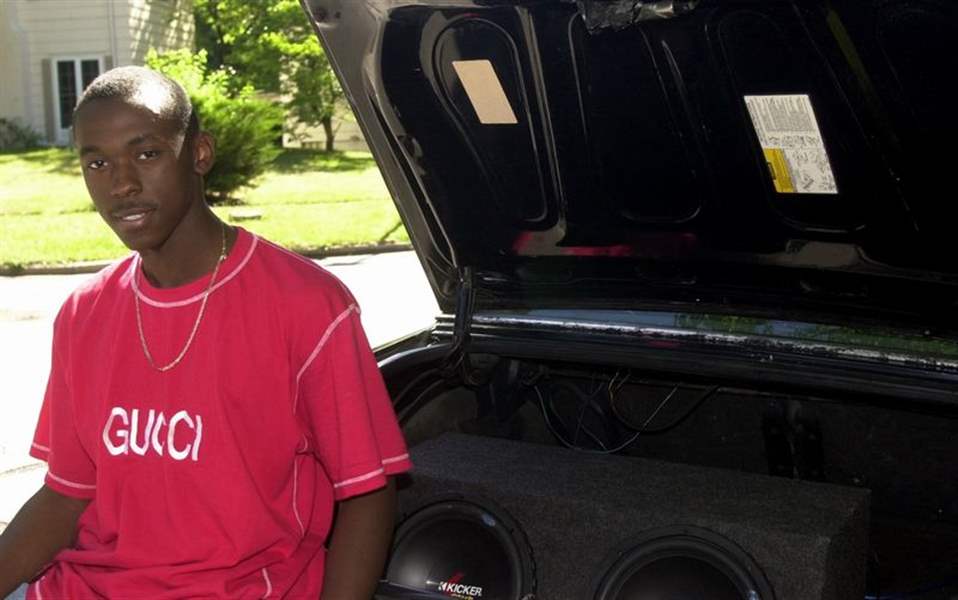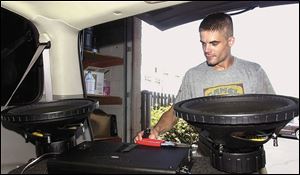
Lowering the boom
7/21/2002
John Walker, 18, of Toledo has two 12-inch subwoofers in the trunk and a 500-watt amplifier but he says he only plays it loud during the daytime because he wants to keep it 'respectable.'
blade

Daryle McGhee installs a $2,200 stereo system in a minivan at Car Stereo One in Toledo.
Bu-boom, bu-boom, bu-boom is coming from the car one lane over at the stoplight in downtown Lima, Ohio. Ellen Hire can't help herself, and looks over at the driver.
“It was that pumping bass,” Mrs. Hire said.
It was about 10:30 on a Monday night. “I'm thinking, `Where's an officer at?'” she said.
Loud car stereos are subject to criminal action under noise ordinances in Lima, Toledo, and many other northwest Ohio and southeast Michigan communities. Blasting your car stereo can result in misdemeanor charges under ordinances designed to deter them as well as loud boomboxes and parties.
Car stereo systems, like the one in Car Stereo One's show truck, reach more than 161 decibels - a jet plane at takeoff generates about 120 decibels.
Mrs. Hire, a Lima councilwoman, has worked on the city's noise ordinance since 1991. Complaints from residents prompted the Allen County city to institute a zero tolerance policy with stiff fines - $100 for a first-time offender and $500 for third-time violators in a two year period - plus $55 in court costs. More than 750 people have been cited since June 1, 2000, according to the police department's records.
In Lima, with a population of about 40,000, the noise ordinance allows police officers to write misdemeanor citations when the noise is unreasonably loud, as determined by the officer. More than 750 noise citations have been issued in the last two years. Lima's total citations include noise from car stereos, residences, or in a public place.
Lima City Council's safety services committee, which Mrs. Hire chairs, met Monday to consider recommending raising fines the way some people turn up the volume on vehicle sound systems. The committee didn't take any action, but will continue to review the ordinance.
Toledo has an ordinance that specifically targets car stereo systems. Offenders can be cited by police for a misdemeanor if the sound from the vehicle's stereo can be heard more than 50 feet away, according to a city ordinance.
More than 550 tickets for noise violations have been written between June 1, 2000, and June 30, 2002, according to Toledo Municipal Court records.
In Fremont, more than 140 people have been cited for loud car stereos from Jan. 1, 2000, through Dec. 31, 2001, the police department said.
In Perrysburg, there were 10 citations for noise ordinance violations in 2000, and nine in 2001, according to the Perrysburg Clerk of Court's office.
Although offenders from loud parties can often be traced, authorities and residents say noise coming from a car is more difficult to pinpoint.
“By the time you get to your door and look out, [the vehicle] is too far away to get a license plate,” Ola Reynolds, a central Toledo resident, said. “We have the people that come down the street and we're inside our house and we can hear it.”
When police are able to catch the car stereo thumpers, they can verbally warn them or issue a citation, said Toledo police Sgt. Mike McGillivray. A citation can mean a fine up to $100 for the first offense.
“It's very effective because it's not cheap,” Sergeant McGillivray said.
But Dave Williamson, who has worked at Car Stereo One in West Toledo for nine years, said the effectiveness of the fine depends on the person.
“Some of the guys wear [the citations] as a badge of honor,” Mr. Williamson said.
Fines aren't the only way Ohio municipalities have enforced their noise ordinances. Last year in Painseville, Judge Michael Cicconetti sentenced a 22-year-old man to two days in jail or three hours out in the silence of a wooded area for blasting his car stereo. The man chose the woods. Judge Cicconetti has sentenced car stereo offenders to listen to classical music.
Toledo police Officer Anita Madison said problems with loud car stereos exist everywhere, not just in any one geographic area of the city.
Sergeant McGillivray said some neighborhoods show more tolerance for loud music. In working class neighborhoods, where people go to bed earlier, he said, police receive more complaints.
When residents are awakened five times a night because of music coming from car stereos or the bass feature rattling their windows, it becomes a quality of life issue, Mrs. Hire said.
The summer - when school is out and car and house windows are open - is the worst, Officer Madison said. Violators of the Toledo car stereo ordinance are usually from driving age to 25 years old and mostly male.
In Maumee, the thumping car stereos often belong to high school students, police said.
“We all know that for high-school-age kids, a real big thing for them is to have a big stereo in the car,” Maumee Lt. Mike Noble said.
By playing the radio loud, he said, “You're advertising you've got a really nice stereo.”
And it's likely to get stolen, Lieutenant Noble warned. Many times when a stereo is stolen from a high school-age driver's car, the thief turns out to be someone who knew the person and knew they had a nice radio, he added.
After installing a new stereo system or perhaps just speakers at Car Stereo One, Mr. Williamson said he brings the customer over to show him or her how it works. A lot of customers turn the sound up high and walk halfway across the parking lot away from the vehicle. That's because about half the people who invest in a car stereo system want people to be able to hear it that far away, he said.
Maumee police have cited more than 20 people since March, 2001, Lieutenant Noble said. Most citations are written when an officer hears the music. An officer is assigned to enforce the ordinance on a somewhat regular basis, he said.
The ordinance has been effective, he said, because it's enforced and word spreads that violations come with a fine of $100.
But sometimes just the existence of a noise ordinance gets the message across.
In Adrian, an ordinance to target noise from car stereos was enacted about two years ago, said Adrian police Lt. Tom Ray.
“We've had a few tickets written on it, but not a lot. I think the reason is because it was so well publicized when it was being considered that most people know about it now,” Lieutenant Ray said. “If they see a police car coming, they intentionally turn down their radio.
“Looking at it from the prospect of complaints from citizens, it's been effective because we haven't really had any complaints from people recently,” he said.
Car sound systems are a hobby that lots of people are interested in, said Dave Granata, from TAS Electronics, which has three locations in Toledo.
“There are particular individuals who just do not understand the difference between being courteous and being rude,” Mr. Granata said, citing people who drive through residential neighborhoods at 3 a.m. with their vehicle's sound system blaring.
“They're idiots,” he said.

John Walker, 18, of Toledo has two 12-inch subwoofers in the trunk and a 500-watt amplifier but he says he only plays it loud during the daytime because he wants to keep it 'respectable.'
John Walker, with his two 12-inch subwoofers in the trunk and a 500 watt amplifier, said he plays his car stereo system loud enough for his trunk to shake - but only during the daytime.
“I try to keep [the sound level] respectable,” he said.
He's had the system for two years, he said, and hasn't had any complaints.
For many people, it's not about having a loud stereo, it's about overall sound quality, Mr. Granata said. Volume is just a part of that.
“We're promoting normal listening volume, good sound quality, and occasional loud volume,” Mr. Granata said of his company's sound equipment.
In addition, he said, spending money on car stereo systems, whether it's $250 or $1,000, means it's not being spent other places.
“It keeps kids out of trouble,” he said. “They could be spending their money somewhere else, getting in a whole lot worse trouble.”
Competitions like the Loudest Car Stereo Contests, which TAS Electronics has sponsored in Toledo, have drawn more than 150 participants - some admitting to putting $6,000 in their systems.
Although the 16 to 25 age group accounts for the majority of the vehicle sound system business in Toledo, Mr. Williamson said there are others in older age groups who seek system upgrades.
On Wednesday a minivan at Car Stereo One was getting a $2,200 upgrade to the stereo system. The owners, Mr. Williamson said, wanted both sound quality and sheer volume.
A quality stereo system, one with “bu-boom” potential, can be beneficial, Mr. Williamson said. For example, he cited a retired man who likes opera music.
“I think that the older generation thinks subwoofers and good systems are just for people who listen to a certain kind of music,” Mr. Williamson said. “It's not just about rap music, it's about having a good stereo.”
Blade staff writer Erica Blake contributed to this report.